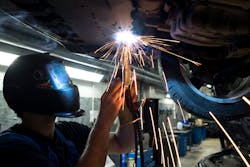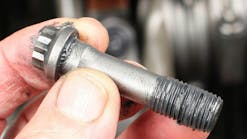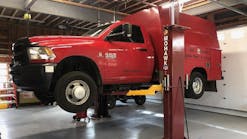Guest Blog: ASME PASE-2019 Standards: What do technicians need to know?

Portable Automotive Service Equipment (PASE), or any piece of automotive service equipment not fixed in one location, is an essential part of every automotive technician’s workshop. In fact, most items in a workshop are categorized as portable automotive service equipment. From floor cranes to dollies and jacks, from stands and ramps to lifts, strut compressors, and shop-presses, these tools are key in making every vehicle service more efficient, and in most cases, possible.
To ensure technicians are safe on the job, the American Society of Mechanical Engineers (ASME) designed and published a set of crucial safety standards specific to the North American region to test and confirm the safety and quality of portable lifting equipment: ASME PASE-2019.
As a technician or shop owner, it’s vital to be familiar with these standards for the safety of yourself, your staff, your business, and even your customers. Here’s an overview of what you need to know when it comes to the most recent ASME PASE-2019 Standards.
What exactly are the PASE Standards?
According to the American National Standards Institute, ASME’s PASE Standards specify “the design, maintenance, and other considerations for a range of equipment and tools essential to automotive vehicle service.” The standards are revised every 5 years, with the most recent version published in November of 2019.
Most importantly, these standards help equipment manufacturers ensure products they’re producing are appropriately safe to use, as well as show purchasers and users (shop owners, supervisors, and technicians) applicable safety communications for the tools they’re interacting with.
Choosing equipment that meets PASE Standards
A very significant point to understand about the ASME PASE Standards is they’re not required. These standards are voluntary and suggested. This means that equipment manufacturers can freely sell equipment that does not meet ASME PASE Standards.
For this reason, as an equipment retailer or distributor, shop owner, or technician, it’s your responsibility to ensure the equipment you’re selecting is up to the most recent ASME PASE-2019 Standards. Below are a few considerations to keep in mind:
1. Avoid selecting equipment based on price.
Instead of reaching for the equipment with the lowest price tag, choose products designed, tested, and confirmed to follow ASME’s PASE-2019 safety standards. While the lower price may seem ideal in the short-term, selecting a higher quality product that meets these strict safety standards will save you countless dollars in the long-term.
These lasting cost savings include a longer product lifecycle and more efficient vehicle repairs, all while lowering the potential for shop or technician down-time by minimizing the risk of property damage or injury.
2. Ensure the equipment has been cycle-tested to ASME PASE-2019 standards.
It’s nearly impossible to consider every “what if” scenario to ensure safety. Many tools will meet ASME PASE-2019 Standards right out of the box, but will they still hold up after 20 uses? After 5,000?
When selecting your equipment, consider the likelihood the product will be ASME PASE-2019 compliant over its full life cycle, rather than the first few uses after purchase.
3. Look for equipment that “stops” if it doesn’t meet the specific standard during use.
Each piece of equipment, whether it’s a stand, jack, or shop press, has a different set of multiple tests within the larger grouping of the ASME PASE-2019 standards. There are 18 different categories of service equipment that fall under ASME PASE-2019 Standards. A test for a jack, for example, may ask manufacturers to apply a load at 150 percent of the recommended capacity and measure if the equipment still holds up, while a stand may require a similar test at 200 percent of rated capacity.
Those tests are used in part to tell the manufacturer what the highest level of capacity that equipment can handle. Rather than simply making sure that capacity is clearly outlined on the machine, look for a manufacturer that puts protections in place when equipment reaches that last-level capacity. Meaning, if the equipment’s capacity is two tons capacity, it should physically stop when the user attempts to lift anything above the limit.
4. Keep technician training in mind.
ASME’s standards were created to keep the users safe. So, when purchasing portable automotive service equipment, ensure that the product is designed to be used easily and efficiently.
To meet ASME PASE-2019 Standards, you need to ensure every piece of equipment includes safety communications on the device, with expectations on how to use the tool, and the specifications the technician needs to know to use it properly.
Any standard will use the term “shall” if it is an absolute requirement, whereas “should” suggests it is strongly requested. Additionally, make sure the product offers a robust user manual that specifies exactly how to use the equipment.
5. Always go with a trusted brand.
ASME doesn’t collect a manufacturer’s data and “pass” specific equipment if it meets PASE Standards, or “fail” if it does not. Rather, it consists of third-party experts who put standards in place based on a wide range of extensive tests. These tests are developed to take each piece of equipment significantly beyond its intended application and make sure it will not fail in a reasonable sense.
For this reason, it’s crucial to look for a brand that bases its company ethos on building quality products you can trust. Any manufacturer can claim they follow the latest ASME PASE Standards, but make sure they have the resources and credibility to back up those claims before you buy.
Like seatbelts were long ago, ASME PASE Standards are still voluntary, so it’s imperative to educate yourself on what they signify and how to know which products comply. Choose products from manufacturers that have adopted ASME’s PASE Standards as their standard of quality, and who go above and beyond their responsibility of keeping technician safety as the utmost requirement.
Information provided by Bosch

